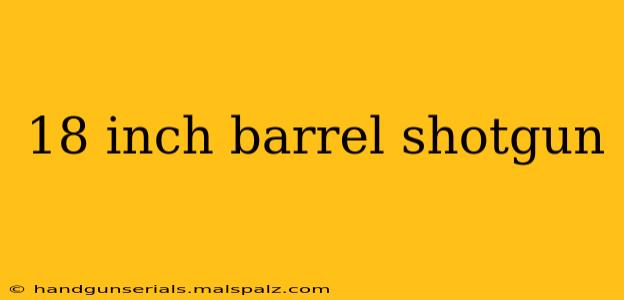The 18-inch barrel shotgun occupies a fascinating niche in the firearms world. Its shorter length offers distinct advantages in certain situations, but it also comes with trade-offs. This comprehensive guide explores the pros and cons, legal considerations, and best uses for shotguns featuring an 18-inch barrel.
Understanding Barrel Length and Shotguns
Before diving into the specifics of an 18-inch barrel, let's understand the general impact of barrel length on shotgun performance. A longer barrel generally provides:
- Increased Velocity: The longer the barrel, the more time the expanding gases have to propel the shot, resulting in higher muzzle velocity and, consequently, increased range and accuracy.
- Improved Pattern Density: A longer barrel allows for a tighter shot pattern at longer distances, making it more effective for hunting and target shooting.
- Reduced Recoil (Sometimes): While counterintuitive, a longer barrel can sometimes reduce felt recoil by allowing more complete combustion of the powder charge.
However, shorter barrels offer their own set of benefits, which are particularly relevant for the 18-inch variant.
Advantages of an 18-Inch Barrel Shotgun
The primary advantages of an 18-inch barrel shotgun lie in its maneuverability and suitability for close-quarters situations:
- Enhanced Maneuverability: Its compact size makes it ideal for navigating tight spaces, making it a popular choice for home defense, tactical applications, and certain hunting scenarios (e.g., thick brush).
- Improved Close-Range Effectiveness: While sacrificing some range, the shorter barrel excels at close-quarters engagements, where pattern density is less critical.
- Reduced Weight: A shorter barrel translates to a lighter overall weight, reducing fatigue during extended use.
Disadvantages of an 18-Inch Barrel Shotgun
Despite its advantages, an 18-inch barrel shotgun comes with drawbacks:
- Reduced Range and Accuracy: Compared to longer-barreled shotguns, the shorter barrel leads to a significant reduction in effective range and a less dense shot pattern.
- Increased Recoil (Potentially): While not always the case, some shooters may experience increased felt recoil with a shorter barrel due to the quicker expulsion of gases.
- Legal Restrictions: The legal status of an 18-inch barrel shotgun varies depending on location and specific regulations. It's crucial to understand local and federal laws before purchasing or possessing one. These regulations often tie into the classification of the shotgun as a "firearm" or "short-barreled shotgun" with specific registration and licensing requirements.
Legal Considerations and Regulations
The legal landscape surrounding 18-inch barrel shotguns is complex and varies widely by jurisdiction. In many places, shotguns with barrels under 18 inches are considered "short-barreled shotguns" (SBS) and are subject to strict regulations under the National Firearms Act (NFA). These regulations often involve registration with the Bureau of Alcohol, Tobacco, Firearms and Explosives (ATF), background checks, and potentially higher taxes. It is crucial to research and comply with all applicable local, state, and federal laws before owning or using a shotgun with an 18-inch barrel.
Best Uses for an 18-Inch Barrel Shotgun
Given its strengths and weaknesses, an 18-inch barrel shotgun is best suited for specific applications:
- Home Defense: Its maneuverability and close-range effectiveness make it a viable option for home defense, though other considerations like ammunition selection and training are equally crucial.
- Tactical Situations: Law enforcement and military personnel may find its compact size advantageous in close-quarters combat.
- Hunting (Specific Situations): In dense brush or heavily wooded areas where long-range shots are unlikely, an 18-inch barrel shotgun can be effective.
Conclusion
The 18-inch barrel shotgun offers a unique balance of maneuverability and firepower. However, potential buyers must carefully weigh the pros and cons, understand the legal ramifications, and choose the right tool for the specific task. Always prioritize safety and responsible firearm handling. Remember, this information is for educational purposes only, and it is not a substitute for professional advice or legal counsel. Consult with local and federal authorities to ensure you comply with all applicable laws and regulations.

